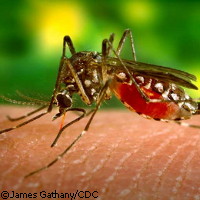Non-flying mosquitoes bred to reduce dengue fever
A British-US research team has introduced a new species of female mosquito that cannot fly in an attempt to stop the spread of the mosquito-borne dengue fever virus, a severe illness with influenza type symptoms that threatens millions of people. The results of the study are published in the journal Proceedings of the National Academy of Sciences (PNAS). Dengue fever (also known as breakbone fever due to the severe muscle and joint pains it causes) is spread by female mosquitoes of the Aedes aegypti species. It is responsible for one of the world's biggest health problems, with 50 to 100 million cases reported each year, and 40 million people worldwide are at risk. The disease is rampant in more than 100 regions worldwide including South America, northern Australia, India, the Philippines, Thailand and Vietnam. Unlike malaria, it occurs in urban as well as rural areas. Currently, there is no vaccine or treatment available. | The genetically modified mosquitoes were created by a consortium of scientists from the University of California Irvine (UCI) in the US, and the University of Oxford and biotechnology company Oxitec in the UK. The new non-flying female mosquitoes are expected to die quickly in the wild, cutting down sharply on transmission of dengue fever. The research team carried out experiments to genetically modify the male mosquitoes of the Ae. aegypti species so when they mate, the next generation of females will be unable to fly. The team hopes that the new breed could suppress the native mosquito population in just nine months. 'Current dengue control methods are not sufficiently effective, and new ones are urgently needed,' said Professor Anthony James from UCI. 'Controlling the mosquito that transmits this virus could significantly reduce human morbidity and mortality.' The team used concepts developed by Oxitec to make a genetic alteration in the male mosquitoes that disrupts the wing muscle development in their female offspring and renders them unable to fly. Males can still fly and they have showed no side effects from the altered gene. 'The technology is completely species-specific, as the released males will mate only with females of the same species,' said Luke Alphey from Oxitec. 'It's far more targeted and environmentally friendly than approaches dependent upon the use of chemical spray insecticides which leave toxic residues.' 'Another attractive feature of this method is that it's egalitarian: all people in the treated areas are equally protected, regardless of their wealth, power or education,' he added. This is a pioneering approach to controlling the spread of dengue fever and the research team says the novel approach could be adapted to other species of mosquito that spread malaria and West Nile fever.
Countries
United Kingdom, United States



